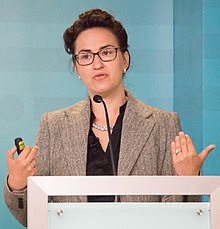This article has multiple issues. Please help improve it or discuss these issues on the talk page. (Learn how and when to remove these messages)
|
Athena Aktipis | |
|---|---|
 Aktipis in 2017 | |
| Education | Reed College – BA (psychology, 2002) University of Pennsylvania – MA (psychology, 2004) and PhD (psychology, 2008) |
| Occupation | Professor |
| Employer | Arizona State University |
| Known for | |
| Website | athenaaktipis |
Christina Athena Aktipis is an associate professor in the department of psychology at Arizona State University.[1] She is the director of the Interdisciplinary Cooperation Initiative and the co-director of the Human Generosity Project. She is also the director of the Cooperation and Conflict lab at Arizona State, vice president of the International Society for Evolution, Ecology and Cancer (ISEEC), and former director of human and social evolution and co-founder of the Center for Evolution and Cancer at UCSF. She is a cooperation theorist, an evolutionary biologist, an evolutionary psychologist, and a cancer biologist who works at the intersection of those fields.[2] Aktipis is the author of the books The Cheating Cell: How Evolution Helps Us Understand and Treat Cancer (2020) and A Field Guide to the Apocalypse: A Mostly Serious Guide to Surviving Our Wild Times (2024).[3] She hosts Zombified, a podcast that discusses the science of zombification in daily life. The podcast is an extension of the Zombie Apocalypse Medicine Meeting (ZAMM), a biannual conference chaired by Aktipis. ZAMM is an interdisciplinary conference where art, science, and medicine come together with the aim of solving complex issues.
- ^ "Athena Aktipis | The Biodesign Institute | ASU". Archived from the original on August 21, 2017.
- ^ Aktipis, Athena (April 9, 2024). A Field Guide to the Apocalypse: A Mostly Serious Guide to Surviving Our Wild Times. Workman Publishing Company. ISBN 978-1-5235-2723-6. Retrieved April 21, 2024.
{{cite book}}:|website=ignored (help) - ^ Aktipis, Athena (March 24, 2020). The Cheating Cell: How Evolution Helps Us Understand and Treat Cancer. Princeton University Press. ISBN 9780691163840.